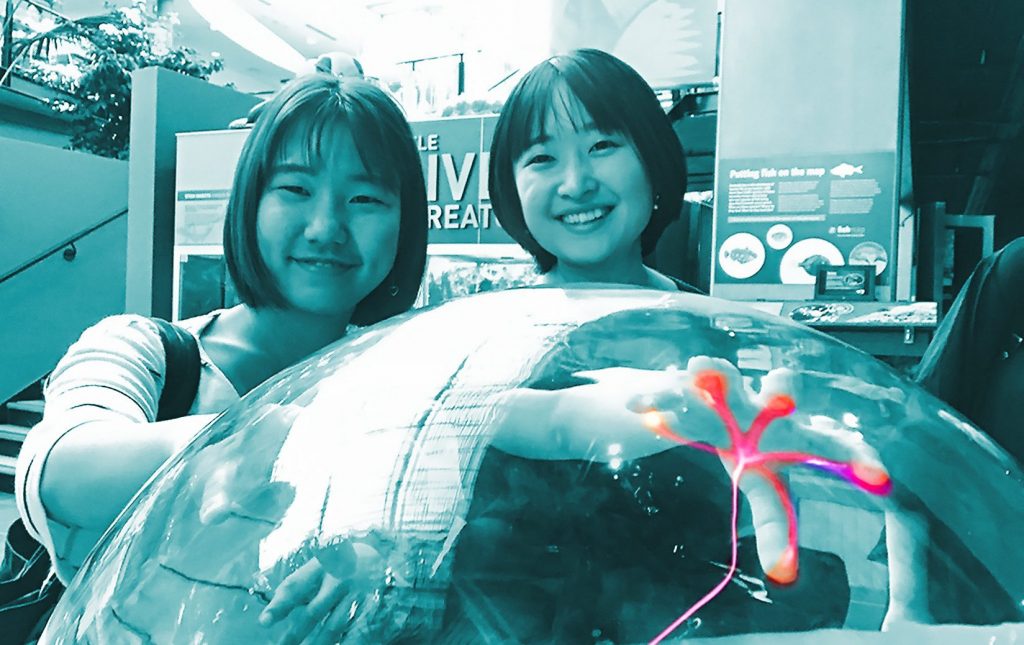Boost your Masters or PhD with communication skills and cross-disciplinary perspectives.

What is the CP SciCom?
Modern society faces increasingly complex and interconnected problems that require respect, understanding, and effective cooperation between science, other disciplines, and the broader community.
The Certificate Program in Science Communication will help you prepare for these challenges through the development of skills and awareness to understand others and communicate your own ideas more clearly.
You will learn fundamental concepts of science communication, broaden your perspectives of science and its relationship with society, and develop communication skills for a range of audiences and settings.
The CP SciCom consists of six credits to be undertaken at the same time as you study for your Masters or PhD program. When you graduate your Masters or PhD you will be awarded an additional certificate, setting you apart from other graduates.
Students of any discipline are eligible to apply, and courses can be taken in English or Japanese.
Program Objectives
We believe that superior communication skills will contribute to our graduates’ career success by better preparing them to secure jobs, win grant proposals, publish research results, establish themselves as authorities in their field, and a host of other activities across disciplinary fields and employment sectors. Communication skills will also help graduates to forge collaborations and be more connected with the needs and support of society.
In addition, greater awareness of and respect for a broader variety of approaches to understanding and evaluating science related issues will help graduates to adapt future research to more closely align with societal needs, views, and values.
With this in mind, the overall aims for the program are:
- To provide students with insight, training, and experience to negotiate the complexities of communicating science in a variety of public contexts, and to prepare them to communicate effectively in the real world.
- To broaden student awareness of a variety of perspectives and modes of thinking related to science, its communication, and its relationship with other sectors of society.
Course Information
To qualify for the CP SciCom students must complete six credits from the list of program courses below.
Courses are divided into three categories—Theory, Skills, and Experience
Theory (Science communication background theory and issues)
– fundamentals and background to the field of science communication, including issues and trends in the field
– trans-disciplinary views of science and related issues
– approaches to meaning making and knowledge building
Skills (Practical communication skills)
– writing and speaking skills for a variety of situations and audiences
– planning interactive learning experiences.
Experience (Practical experience and internships)
– practical experience and exposure to professional science communication settings and research environments
– project planning and implementation with real-world outputs
Students can select courses totalling six credits, which are most appropriate for their own needs and interests, while adhering to the following guidelines.
- At least two credits must be taken from the Theory Courses block, including two of either 0AH0310, 0AH0318, 0A00205, or 0A00206.
- At least one credit must be taken from the Skills Courses block.
- One credit only can be selected from the Experience Courses block.
- The remaining two credits can be selected from either Theory or Skills courses.
Theory Courses
| Course number | Course Title | Language | Credits | Term |
| 0AH0310 | Special Lecture on Science Communication | EN | 1 | SprC (Int) |
| 0AH0318 | Topics and Issues in Science Communication | EN | 1 | SprC (Int) |
| 0AH0319 | Introduction to STS (Science, Technology, and Society) | JP | 1 | Smr Vac (Int) |
| 0ANB014 | Intercultural Communication | EN | 2 | SprAB |
| 0A00205 | Science Communication in General | JP | 1 | SprAB |
| 0A00206 | Advanced Science Communication | JP | 1 | FallAB |
Skills Courses
| Course number | Course Title | Language | Credits | Term |
| 0A00207 | Science Communicator Practical Training Program | JP | 2 | |
| 0AS0301 | Visual Design for Research | JP | 1 | SprAB |
| 0A00202 | Presentations for General Audiences | EN | 1 | SprC |
| 0ANA058 | Science Writing | JP | 1 | Sum |
Experience Courses
| Course number | Course Title | Language | Credits | Term |
| 0ANA061 | Science Communication International Internship | EN/ JP | 1 | Annual |
| 0ANA062 | Science Communication Field Placement | EN/ JP | 1 | Annual |
| 0ANA063 | Science Communication Project | EN/ JP | 1 | Annual |
| 0ANA064 | Self Learning Activity I | EN/ JP | 1 | Annual |
* Note that some courses require students to be enrolled in a personal accident insurance policy (Gakkensai).
How to Apply
To register for the Certificate Program in Science Communication, students must be currently enrolled in a Masters or PhD program at the University of Tsukuba.
Places are limited to 10 students per year. In the event that more than 10 students nominate for the program, places will be decided by lottery.
Second round applications for the 2025 intake are now open.
Applications will be screened based on motivation to learn from the program and potential future impact. From the resulting qualifying applications, the final allocation of places will be decided by lottery.
In the event that program places remain unfilled, registrations will continue to be accepted after April 18 and places will be assigned to qualifying applicants on a first come first served basis.
Since program places are limited, withdrawing from the program before completion deprives other students of the opportunity to participate. Therefore, students who register for the program are expected to commit to the program and complete all requirements for the certificate.
Contact Form
If you have any questions about the Certificate Program in Science Communication, feel free to contact us using the contact form below.
